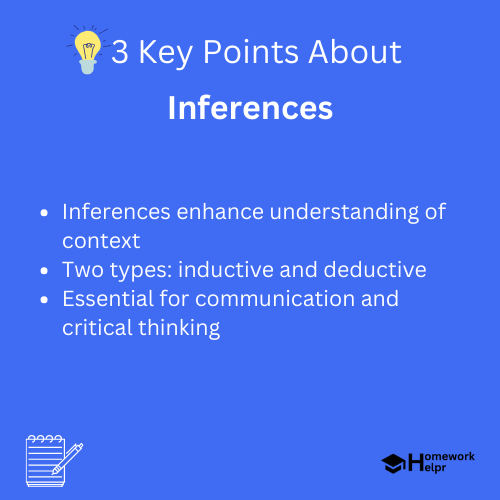📝 Summary
Inferences are a crucial aspect of human cognition that enable individuals to draw logical conclusions beyond explicit information. They enhance our understanding of context and communication, functioning through perception, memory, and reasoning. Inferences can be categorized into inductive, drawing general conclusions from specific observations, and deductive, applying general statements to specific cases. While they enrich various fields such as literature, science, and mathematics, one must navigate challenges like bias and incomplete information to avoid misconceptions. Inferences are vital for effective communication and critical thinking.
Understanding Inferences
Inferences are a fascinating aspect of human cognition that allow us to draw conclusions and make sense of the world around us. An inference is essentially a logical deduction that goes beyond the explicit information presented. We use inferences frequently in our daily lives, whether we’re reading a book, listening to a conversation, or observing the environment. This article will explore the concept of inferences, different types, their mechanisms, and their significance in various disciplines.
The Basics of Inferences
To define inferences more clearly, we need to understand that they are based on known information and personal experiences. For instance, if you’re reading a story where it rains, and the characters are wearing raincoats, you might infer that they expect rain. The ability to infer enhances our understanding of context and enriches communication.
Definition
Cognition: The mental action or process of acquiring knowledge and understanding through thought, experience, and the senses. Deduction: The process of reasoning from one or more statements (premises) to reach a logically certain conclusion.
Types of Inferences
There are primarily two types of inferences: inductive and deductive. Understanding these types can help us see how inferences function in various scenarios.
Inductive Inferences
Inductive reasoning involves drawing general conclusions from specific observations. For example, if you notice that the sun rises in the east every morning, you may infer that the sun always rises in the east. Inductive inferences are never 100% certain but are typically based on recurring evidence.
Examples
If you have seen multiple white swans in a park, you might infer that all swans are white. However, this is not necessarily true as there are black swans in other regions.
Deductive Inferences
On the other hand, deductive reasoning starts with a general statement and applies it to a specific case. For instance, if you know that all birds have feathers and you see a parrot, you can infer that the parrot has feathers. This type of reasoning offers more certainty than inductive reasoning.
Examples
All mammals breathe air. A dolphin is a mammal; hence, it must breathe air. This is a straightforward deduction from general premises.
The Mechanism of Inferences
Inferences work through a cognitive process that involves various components such as perception, memory, and reasoning. Here‚’ how this mechanism operates:
- Perception: Individuals gather information through their senses.
- Memory: Past experiences help to shape how new information is interpreted.
- Reasoning: Logical connections are made, leading to conclusions.
When we perceive a scene, we often extract valuable details to formulate links with our previous knowledge. For instance, if someone is crying at a party, we could infer they are not enjoying themselves, given the social context.
❓Did You Know?
Did you know that children start making inferences as early as the age of 2? They can deduce information from the environment even before they can express it verbally!
Inferences in Different Disciplines
Inferences play a critical role across various fields, including literature, science, and mathematics.
In Literature
Readers often make inferences while analyzing texts. The ability to understand nuances is essential in detecting themes, characters’ motives, and underlying messages. For example, when a character looks out at a stormy sea in a story, one may infer feelings of turmoil or internal conflict.
In Science
Inferences form the basis of scientific research. When collecting data, scientists draw inferences to form hypotheses and theories. For instance, if plants grow towards light, one might infer that light is essential for photosynthesis, hence leading to further investigations.
In Mathematics
Mathematics also involves inference, particularly in proofs. Mathematicians often infer the validity of a theorem from previously established principles. For example, using the Pythagorean theorem ((a^2 + b^2 = c^2)) allows one to infer relationships in geometric shapes.

Challenges in Making Inferences
Despite the usefulness of inferences, they are not without challenges. Misinterpretations can occur based on biases, incomplete information, or preconceived notions. False inferences lead to misconceptions and can affect perceptions of reality.
- Bias: Personal preferences can color one‚’ interpretation.
- Incomplete Data: Making an inference based on limited information can lead to errors.
- Preconceived Notions: Existing beliefs may obstruct accurate understanding.
The Significance of Inferences in Everyday Life
The skill of making inferences is essential for effective communication and critical thinking. Inferences enable us to read between the lines, understand others’ emotions, and predict future events. In a classroom setting, this skill aids in comprehension and analytic skills.
Examples
When a teacher notices that a student is distant and inattentive, they might infer that the student is struggling with a particular subject or facing personal issues.
Conclusion
Inferences are a crucial component of human understanding and interaction. They allow us to navigate the complexities of life effectively, enhancing our ability to communicate, reason, and connect with one another. By honing the skill of making accurate inferences, we can become better thinkers, learners, and communicators. As we continue to explore the world, let‚’ remember the power of inferences in shaping our comprehension and experiences.
Related Questions on Inferences
What are inferences?
Answer: Inferences are logical deductions based on information.
What are the two types of inferences?
Answer: Inductive and deductive are the two types.
Why are inferences important in literature?
Answer: They help analyze themes and character motives.
What challenges do inferences pose?
Answer: Bias and incomplete information can lead to misconceptions.
